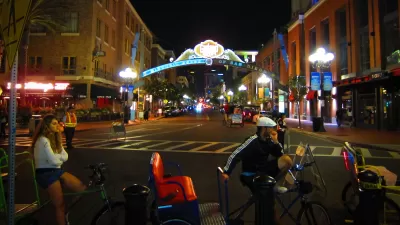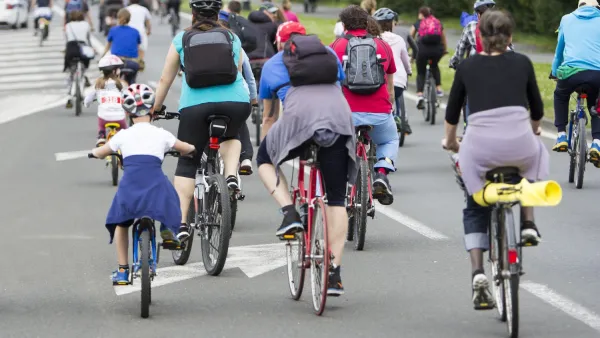AARP finds that 29% of older Americans polled say they are now walking as a way to avoid high gas prices, but 40% say the sidewalks in their area are inadequate.
"A new poll by AARP finds that while many Americans ages 50+ are trying to move away from car transportation as a result of high gas prices, their attempt to go "green" is challenged by inadequate sidewalks and bike lanes, as well as insufficient public transportation options. "More Americans age 50+ are trying to leave their cars behind but face obstacles as soon as they walk out the door, climb on their bikes or head for the bus," said Elinor Ginzler, AARP Senior Vice President for Livable Communities.
Here are a few additional results from the poll that are of particular interest:
• Almost 40 percent of the 50+ Americans polled say sidewalks in their neighborhood are inadequate; 55 percent say that they don't have bike lanes or paths in their neighborhood, and 48 percent say there is not a comfortable place to wait for the bus.
• Yet despite these barriers, about 40 percent of respondents reported they have given up their car for some trips and are walking (29%), taking transit (16%) or riding a bicycle (15%) more often to beat high gas prices.
• Of those who reported an inhospitable environment in their neighborhoods, more than half, 54%, said they would walk, bicycle, and take transit more if their streets were improved. This shows the tremendous unmet potential of our street network to provide more ways to get around.
• A majority of those polled also expressed support for complete streets policies, which ensure that roads are planned, designed, and built for all users. 56% said they were ‘extremely or very' likely to support such policies, and 22% said they were ‘somewhat' likely to be supportive."

Planetizen Federal Action Tracker
A weekly monitor of how Trump’s orders and actions are impacting planners and planning in America.

Restaurant Patios Were a Pandemic Win — Why Were They so Hard to Keep?
Social distancing requirements and changes in travel patterns prompted cities to pilot new uses for street and sidewalk space. Then it got complicated.

Map: Where Senate Republicans Want to Sell Your Public Lands
For public land advocates, the Senate Republicans’ proposal to sell millions of acres of public land in the West is “the biggest fight of their careers.”

Orange County, Florida Adopts Largest US “Sprawl Repair” Code
The ‘Orange Code’ seeks to rectify decades of sprawl-inducing, car-oriented development.

Maui's Vacation Rental Debate Turns Ugly
Verbal attacks, misinformation campaigns and fistfights plague a high-stakes debate to convert thousands of vacation rentals into long-term housing.

San Francisco Suspends Traffic Calming Amidst Record Deaths
Citing “a challenging fiscal landscape,” the city will cease the program on the heels of 42 traffic deaths, including 24 pedestrians.
Urban Design for Planners 1: Software Tools
This six-course series explores essential urban design concepts using open source software and equips planners with the tools they need to participate fully in the urban design process.
Planning for Universal Design
Learn the tools for implementing Universal Design in planning regulations.
Heyer Gruel & Associates PA
JM Goldson LLC
Custer County Colorado
City of Camden Redevelopment Agency
City of Astoria
Transportation Research & Education Center (TREC) at Portland State University
Camden Redevelopment Agency
City of Claremont
Municipality of Princeton (NJ)




























